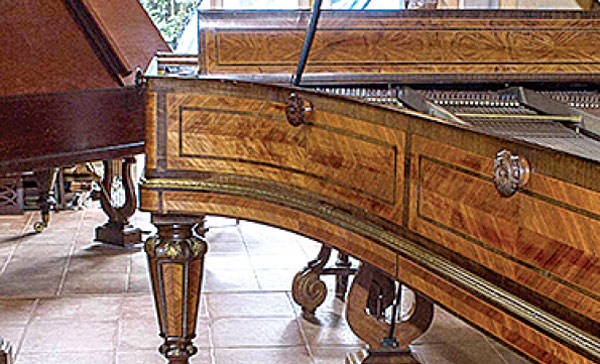Eccentric French collector turns home into piano 'orphanage'
Jean Jude, glasses perched on the end of his nose, is practicing scales when his visitor arrives.
"Sorry there isn't much room in here," Jude says, getting up from one piano before wending his way among countless others filling his living room, part of a unique collection totaling around 150.
Jude and his cat live among the pianos in a four-bedroom house at the end of a cul-de-sac in Saint Pierre des Corps, a suburb of the central French city of Tours.
|
This 1855 rosewood Pleyel piano belongs to Jean Jude, who has collected pianos since 1970 and gathered a collection of 150 pianos with the oldest dating back to 1782. Agence France-Presse |
A wooden gate opens into a yard cluttered with pianos stored in crates and protected from the elements with blue tarpaulins.
These are overflow instruments the 63-year-old music teacher can't manage to squeeze inside or in the garage.
His passion for the stately instruments has driven Jude to rescue scores of them from oblivion, sniffing out hidden treasures at charity shops and auctions, then restoring them when necessary.
"You're in a sort of orphanage here," Jude says, smiling.
"In the '70s and '80s it was fashionable to turn pianos into furniture. Many of those that I bought for a pittance would no doubt have ended up as bars, bookcases or writing desks."
People often are unaware of the value of the pianos they give away or sell for a song.
Five of Jude's pianos have been recognized as national heritage: an upright Clementi from 1820; a 1836 Pape grand; and three Pleyels, including the first grand built by the iconic French piano maker in 1820; a concert grand from 1843; and an 1825 square piano.
The oldest piece in the collection dates to 1782.
But it was an 1855 Pleyel model, built specially for that year's Universal Exhibition in Paris, that Jude loaned to the capital's Grand Palais museum for a recent forum on French innovation.
"The press spoke of it in glowing terms (in 1855). It still has a very good sound," Jude remarks, playing a few notes on the elegant instrument made of rosewood with bronze trim.
At the Grand Palais event, it was juxtaposed with Pleyel's latest model, a futuristic creation with lid and legs made of carbon fiber - underscoring the venerable company's evolution from its beginnings as piano maker to Frederic Chopin.
For Jude, the journey has been in the collecting.
"My family couldn't afford to buy a piano. I grew up with the idea that obtaining such an instrument was taboo," he says.
His first piano lesson from an elderly teacher in 1968 blew the taboo to pieces.
Determined to equal her mastery of Mozart's Turkish March, the aspiring musician saved up his own money to buy a piano - unbeknownst to his parents.
"I was seriously chewed out when the delivery men arrived, but that consuming passion has stuck with me to this day," he says.
Jude is generous with his collection, willingly lending instruments to record companies or musicians who want to record pieces on period pianos.
Among his gems is a piano that once belonged to French president Sadi Carnot, who governed from 1887 to 1894.
Another is a rosewood Pleyel upright that once belonged to the writer Honore de Balzac's sister Laure Surville.
Rare pieces like this could fetch small fortunes, but while admitting to having received some tempting offers, Jude confesses to more than a shade of separation anxiety.
"I'm not psychologically prepared to let go of my pianos," he says.
He does, however, dream of founding a museum to house his collection.
The learned piano protector would, of course, serve as a guide.



















